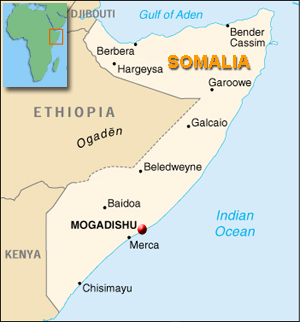|
|
SOMALIA: Form government of national unity, transitional leaders urged
[ This report does not necessarily reflect the views of the United Nations]
|

|
NAIROBI, 22 Dec 2004 (IRIN) - An international think-tank has warned that efforts to restore civil authority in war-torn Somalia could fail unless the new president, Abdullahi Yusuf Ahmed, and his allies formed a "genuine government of national unity" during the transition period.
"Yusuf and his partners need to use their political advantage to form a genuine government of national unity, rather than attempt to impose their own agenda on the transition," the International Crisis Group (ICG) said in its latest report on Somalia, which was released on Tuesday.
"The international community needs to make clear that only if this happens will the TFG [Transitional Federal Government] get the recognition and support it desperately seeks," ICG said in the report. "The probable alternative is resumption of Somali's conflict through all-too-familiar means."
Somalia's transitional parliament passed a vote of no confidence in Prime Minister Ali Muhammad Gedi on 11 December, saying the president had not followed the procedure provided for in the constitution when he appointed him. The parliament also rejected Gedi's cabinet.
Yusuf re-appointed Gedi on 13 December as prime minister, but he has yet to present himself before parliament for approval, which is required before he can reconstitute his cabinet.
Somalia's TFG was formed in the Kenyan capital, Nairobi, in October following reconciliation talks that lasted two years. Insecurity has so far prevented the new administration from moving to Somalia.
The ICG recommended that the new government work towards a comprehensive ceasefire among warring groups that have fought each other since 1991, when the regime of Muhammad Siyad Barre was toppled, to pave way for the deployment of an African Union (AU) monitoring and observer force in Somalia.
The TFG must also negotiate with armed groups currently in control of Somalia's economic infrastructure, so that the new administration can have some sources of revenue, the ICG said.
It urged the AU to continue planning the deployment of a modest monitoring, observation and protection force in Somalia, including some training for Somali security forces, and insist on the preconditions of a measurable ceasefire plan and parliamentary approval for the force to be in place prior to its employment.
The AU force should exclude troops from "front-line states" (Djibouti, Ethiopia and Kenya), or at least from any role that could expose them to combat operations, ICG said.
The think-tank recommended the UN should augment its representation in Somalia to the level of special representative of the Secretary-General and urged the world body to appoint a diplomat from a disinterested and impartial nation to the post.
It called for the expansion of the UN Political Office for Somalia to a fully-fledged Peace Building Office on the condition that the TFG returns to Somalia and demonstrates a reasonable degree of legitimacy and authority.
It also recommended that the European Union, United States, AU, the regional Intergovernmental Authority on Development, Arab League and other states develop plans for short and long-term support to the Somali government, along the lines of the Rapid Assistance Plan and Recovery and Development Plan, already under discussion.
Full Report is available on: www.icg.org 
[ENDS]
|
|





